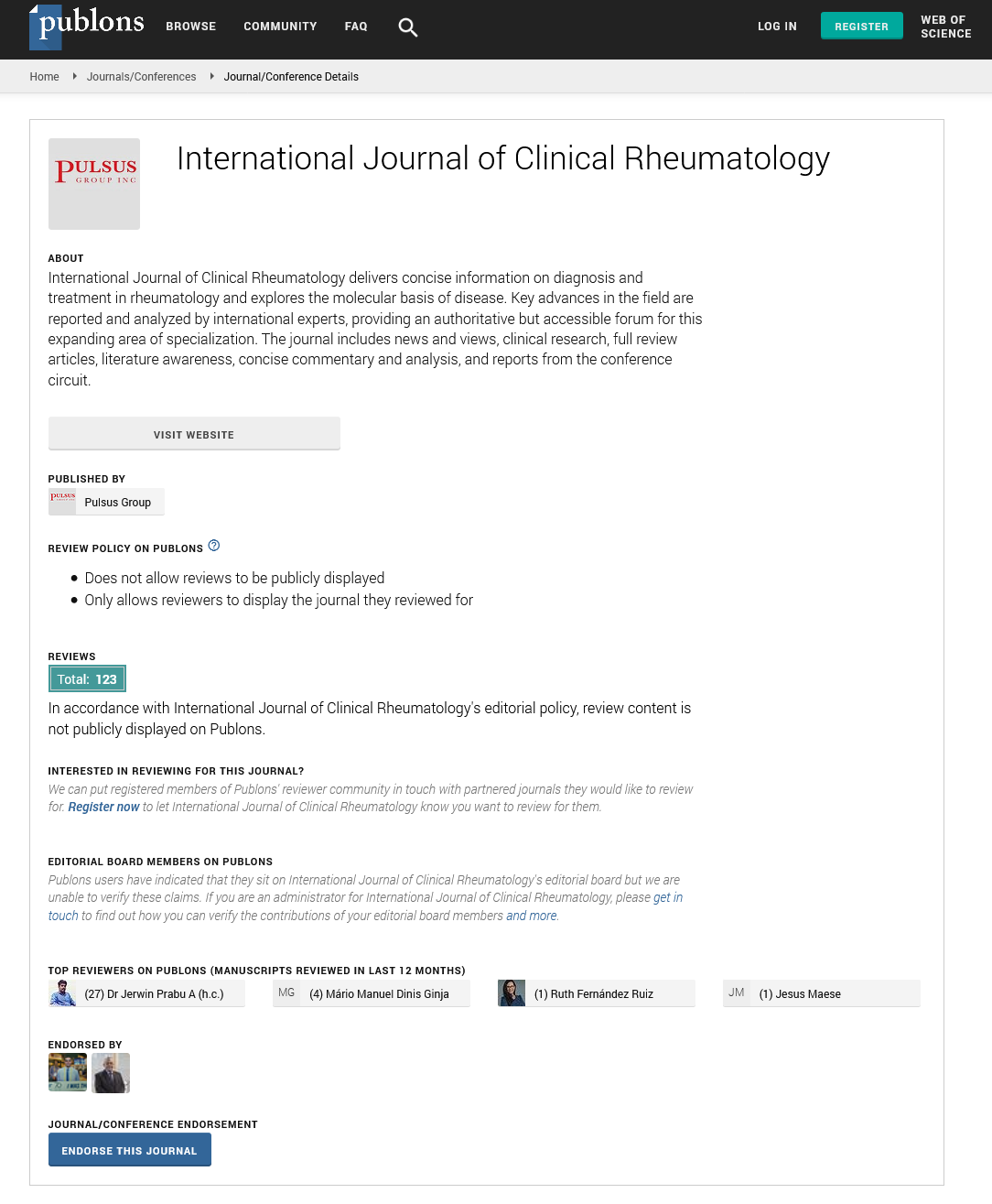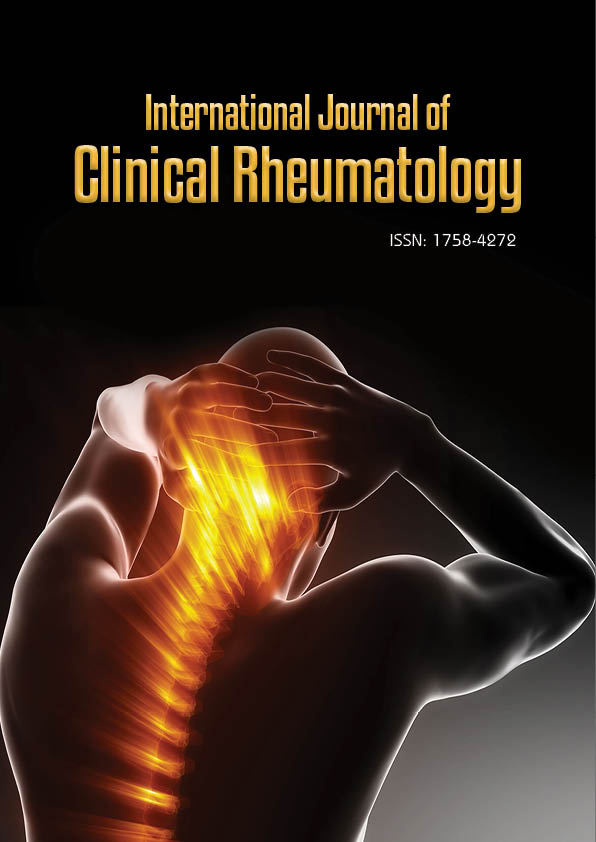Opinion Article - International Journal of Clinical Rheumatology (2022) Volume 17, Issue 4
New medication guidelines for rheumatic disease patients having joint replacement
Adela Ortiz Castillo*
Unidad de Investigación en Enfermedades Crónico-Degenerativas, Guadalajara, México
- *Corresponding Author:
- Adela Ortiz Castillo
Unidad de Investigación en Enfermedades Crónico-Degenerativas, Guadalajara, México
E-mail: Castillo@yahoo.com
Received: 04-Apr-2022, Manuscript No. IJCR-22-091; Editor assigned: 05-Apr-2022, PreQC No. IJCR-22-091(PQ); Reviewed: 18-Apr-2022, QC No. IJCR-22-091; Revised: 22-Apr-2022, Manuscript No. IJCR-22-091(R); Published: 28-Apr-2022, DOI: 10.37532/1758-4272.2022.17(4).092-093
Abstract
Introduction
In the first such collaboration of its kind, an expert panel of rheumatologists and orthopedic surgeons has developed guidelines for the perioperative management of antirheumatic medication in patients undergoing total hip or knee replacement.
"Patients with rheumatic diseases who have joint replacement surgery are at increased risk for joint infection, a potentially devastating complication. As infection risk is linked to the use of anti-rheumatic medication, our goal was to develop recommendations on when to stop medication prior to joint replacement and the optimal time for patients to restart treatment after surgery [1]. Appropriate medication management in the perioperative period may provide an important opportunity to lower the risk of an infection or other adverse outcome.
About the Study
The American College of Rheumatology (ACR) and the American Association of Hip and Knee Surgeons sponsored the project, and the guidelines were published in a peer-reviewed medical journal [2]. The recommendations are based on an extensive review of the available literature on the subject, clinical expertise and experience, and input from patients.
The expert panel consisted of 31 specialists from more than 20 hospitals and professional organizations. The medication guidelines concern adults with rheumatoid arthritis; spondyloarthritis, including ankylosing spondylitis and psoriatic arthritis; juvenile idiopathic arthritis; and lupus undergoing hip or knee replacement [3].
"Prior to our study, there was little to no consensus among orthopedic surgeons or rheumatologists on the optimal way to manage anti-rheumatic medication in patients having joint replacement surgery, and this often led to uncertainty in decision-making for physicians and patients alike. Our project brought together hip and knee replacement surgeons, rheumatologists and methodologists to determine optimal medical management through a group consensus process [4]. In addition, a panel of 11 patients provided input on their preferences.
Investigators conducted a multi-step systematic literature review, screening thousands of articles. Evidence was compiled for continuing anti-rheumatic treatment versus withholding medication in the perioperative period. Researchers also sought to develop recommendations for optimal steroid management during this time.
The study included traditional diseasemodifying anti-rheumatic drugs (DMARDs), biologic agents, tofacitinib, and glucocorticoids. The panel developed guidelines on when to continue, when to withhold, and when to restart these medications, as well as the optimal perioperative dosing of corticosteroids [5].
Among the main recommendations:
Non-biologic DMARDs may be continued throughout the perioperative period in patients with rheumatoid arthritis, spondyloarthritis, juvenile idiopathic arthritis and lupus undergoing elective hip or knee replacement.
Biologic medications should be withheld as close to one dosing cycle as scheduling permits prior to elective hip or knee replacement and restarted after evidence of wound healing, typically 14 days, for all patients with rheumatic diseases.
The patient panel, which had significant input, attached far greater importance to preventing infection at the time of surgery than to the possibility of a disease flare from stopping medication.
The recommendations are intended for use by clinicians, including orthopedists, rheumatologists, and other physicians performing risk assessment and evaluation, as well as by patients. Communication is key. It is imperative that open and informed communication between the patient, orthopedic surgeon and rheumatologist take place.
Conclusion
The panel noted that the guidelines address common clinical situations, but may not apply in exceptional or unusual situations. While cost is a relevant factor in healthcare decisions, it was not considered in this project.
References
- Lindqvist E, Saxne T, Geborek P et al. Ten year outcome in a cohort of patients with early rheumatoid arthritis: health status, disease process, and damage. Ann Rheum Dis. 61, 1055-1059(2002).
- Wallace DJ, Metzger AL, Stecher VJ et al. Cholesterol-lowering effect of hydroxychloroquine in patients with rheumatic disease: reversal of deleterious effects of steroids on lipids. Am J Med. 89, 322-326 (1990).
- Anghel LA, Farcaş AM, Oprean RN. Medication adherence and persistence in patients with autoimmune rheumatic diseases: a narrative review. Patient Prefer Adherence. 12, 1151 (2018).
- Close DR. Matrix metalloproteinase inhibitors in rheumatic diseases. Ann Rheum Dis. 60(suppl 3), 362-367 (2001).
- Gualtierotti R, Parisi M, Ingegnoli F. Perioperative management of patients with inflammatory rheumatic diseases undergoing major orthopaedic surgery: a practical overview. Adv Ther. 35, 439-456 (2018).
Indexed at, Google Scholar, Crossref
Indexed at, Google Scholar, Crossref
Indexed at, Google Scholar, Crossref
Indexed at, Google Scholar, Crossref


